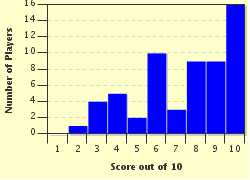Quiz Answer Key and Fun Facts
1. What man did David say could "always dine at his table with him." (2 Samuel 9:7)
2. Who was the man whose seven sons and three daughters apparently loved to dine?
3. What king saw a disembodied hand write a message on the wall of his palace during a gala banquet? (Daniel 5)
4. What queen ended up being deposed when she refused to show up at the king's banquet? (Esther 1:9)
5. According to Esther 5:4, what two guests did Esther invite to a banquet?
6. In what parable in the New Testament do you read about a fattened calf being slaughtered for a special banquet? (Luke 15:11-32)
7. According to Matthew 9:10-11 in the NKJV, what group of people did Jesus dine with that incensed the Pharisees the most?
8. What disciple hosted a banquet for his friends and Jesus after he accepted Christ's invitation to follow Him? (Luke 5:27-32)
9. Without question, the most famous banquet in the Christian Bible is the Last Supper, attended by Jesus and His disciples. Whereabouts did the Last Supper take place? (Mark 14:15)
10. There is a popular Bible verse that contains the word 'dine'. The verse, in the NKJV, states: "Behold, I stand at the door and knock. If anyone hears My voice and opens the door, I will come in to him and dine with him, and he with Me." In what New Testament book do you find this verse?
Source: Author
Cowrofl
This quiz was reviewed by FunTrivia editor
looney_tunes before going online.
Any errors found in FunTrivia content are routinely corrected through our feedback system.

